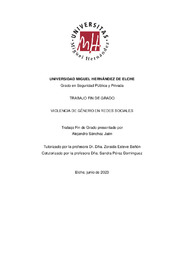Por favor, use este identificador para citar o enlazar este ítem:
https://hdl.handle.net/11000/30446Registro completo de metadatos
| Campo DC | Valor | Lengua/Idioma |
|---|---|---|
| dc.contributor.advisor | Esteve Bañón, Zoraida | - |
| dc.contributor.advisor | Pérez Domínguez, Sandra | - |
| dc.contributor.author | Sánchez Jaén, Alejandro | - |
| dc.contributor.other | Departamentos de la UMH::Ciencia Jurídica | es_ES |
| dc.date.accessioned | 2024-01-08T16:03:24Z | - |
| dc.date.available | 2024-01-08T16:03:24Z | - |
| dc.date.created | 2023-06 | - |
| dc.identifier.uri | https://hdl.handle.net/11000/30446 | - |
| dc.description.abstract | Internet y las redes sociales son el medio por excelencia donde la población joven se comunica en su día a día, y es precisamente por ello que el tipo de socialización que establecen virtualmente, es un reflejo de la cultura y la sociedad donde estos chicos y chicas crecen y se desarrollan. Tenemos en mente que cuando pensamos en una conducta de maltrato, todos nos imaginamos, insultos, humillaciones o control, pero siempre cara a cara. Sin embargo, las relaciones de pareja también se desarrollan en las redes sociales. En este sentido, lo que pasa en nuestros móviles es parte de nuestra vida real porque afecta a nuestra salud mental y quienes ejercen este tipo de violencia sutil han de saber que su comportamiento no es sano. Por esta razón, el presente trabajo tiene como objetivo principal, analizar a través de una encuesta, la percepción que tiene la población joven sobre determinadas conductas que se ejercen en el espacio virtual y si identifican estas conductas como el inicio de una relación controlada. | es_ES |
| dc.description.abstract | The Internet and social networks are the means par excellence where the young population communicates on a daily basis, and it is precisely for this reason that the type of socialization that they establish virtually is a reflection of the culture and society where these boys and girls they grow and develop. We keep in mind that when we think of abusive behavior, we all imagine insults, humiliation or control, but always face to face. However, relationships also develop on social networks. In this sense, what happens on our mobiles is part of our real life because it affects our mental health and those who exercise this type of subtle violence must know that their behavior is not healthy. For this reason, the present work's main objective is to analyze through a survey the perception that the young population has about certain behaviors that are exercised in the virtual space and if they identify these behaviors as the beginning of a controlled relationship. | es_ES |
| dc.format | application/pdf | es_ES |
| dc.format.extent | 46 | es_ES |
| dc.language.iso | spa | es_ES |
| dc.publisher | Universidad Miguel Hernández de Elche | es_ES |
| dc.rights | info:eu-repo/semantics/openAccess | es_ES |
| dc.rights | Attribution-NonCommercial-NoDerivatives 4.0 Internacional | * |
| dc.rights.uri | http://creativecommons.org/licenses/by-nc-nd/4.0/ | * |
| dc.subject | Violencia digital | es_ES |
| dc.subject | juventud | es_ES |
| dc.subject | redes sociales | es_ES |
| dc.subject | relación de pareja | es_ES |
| dc.subject | educación | es_ES |
| dc.subject.other | CDU::3 - Ciencias sociales::34 - Derecho::343 - Derecho penal. Delitos | es_ES |
| dc.title | Violencia de género en redes sociales | es_ES |
| dc.type | info:eu-repo/semantics/bachelorThesis | es_ES |

Ver/Abrir:
PER_TFG_SÁNCHEZ_JAÉN_ALEJANDRO.pdf
623,1 kB
Adobe PDF
Compartir:
 La licencia se describe como: Atribución-NonComercial-NoDerivada 4.0 Internacional.
La licencia se describe como: Atribución-NonComercial-NoDerivada 4.0 Internacional.
.png)